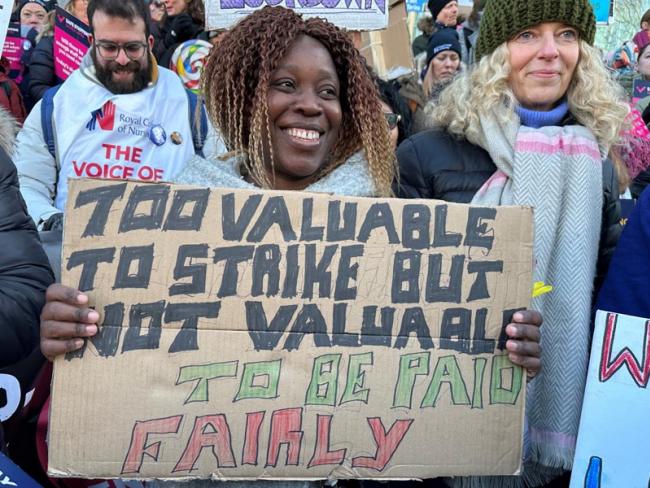
Striking nurses outside University College Hospital, London, January. Photo Workers.
The resurgence in working class struggle – after years of relative quiet – is proof that progress is possible. And it’s no surprise that it centres on pay, the heart of the relationship between employers and employed.
Yet in the past big upturns in working class activity have been frittered away, with the rule of capital managing to re-establish itself. The 1970s are a notable example. And industrial action tapered off in the early 1990s too after making a comeback in the late 1980s.
Today we are at a promising juncture, but to make progress for our class all involved must embrace a convincing strategy. There is one necessary premise. Workers must keep charge over matters at work and in society, not let their guard drop, nor allow the recently gained active involvement to lapse whatever happens as specific disputes reach temporary settlements.
It will take a protracted approach to shift the balance of power between the ruling class and the working class.
And responsibility for advance can never be handed over to others. Workers must disengage from reliance on parliamentary parties and end the ruinous habit of fawning over a Labour Party that has never produced the goods, and never will. Our salvation depends on us, alone.
Instead struggle must spread further, into more spheres and sectors of society. We strengthen our influence when we govern events by action. That’s the way to increase our power and rebuild the labour movement.
Nor should we make a fetish of strikes. Action short of a strike, “working to rule” and dictating collective restrictions over the amount of work to be done, is often effective – and sustainable. Many recent pay struggles have been well conducted, avoiding the lure of unfeasible all-out strikes and instead adopting a more guerrilla approach.
We should not cede the initiative to a system that wants to stifle our aims. As pay settlements are reached – and sooner or later they will be – the return to work cannot be a case of “as you were”. In factories, offices, schools and hospitals, workplace trade union organisation has sprung to life again. It must not be allowed to die back.
An answer to the problems of existence under capitalism does not reside in Westminster shenanigans, still less in separatist or regional assemblies. All are talking shops that endorse the operations of finance capital and big business that have no interest in the lives of workers.
There is no alternative to relying on ourselves, for workers are the only true source of progress.
There should be no pause in effort, just changes of emphasis and intensity of struggle. For Britain to work in our interests, we must act for fundamental change. No one else will.
